Saxophone Sheet Music
 "Without music, life is a journey through a desert." Pat Conroy
"Without music, life is a journey through a desert." Pat Conroy
Rick Astley

Richard Paul Astley (born 6 February 1966) is an English singer, songwriter and radio personality, who has been active in music for several decades. He gained worldwide fame in the 1980s, having multiple hits including his signature song "Never Gonna Give You Up", "Together Forever" and "Whenever You Need Somebody", and returned to music full-time in the 2000s. Outside his music career, Astley has occasionally worked as a radio DJ and a podcaster.Born and raised in Lancashire, Astley became a musician after leaving school, as the drummer for the soul band FBI. Three years later, he rose to fame through his association with the production trio Stock Aitken Waterman; releasing the 1987 album Whenever You Need Somebody, which sold 15.2 million copies worldwide. His debut single "Never Gonna Give You Up" was a number 1 hit single in 25 countries, winning the 1988 Brit Award for Best British Single.
Edith Piaf
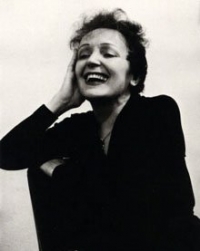
Édith Piaf (19 December 1915—10 October 1963) was a French singer and cultural icon who "is almost universally regarded as France's greatest popular singer." Her singing reflected her life, with her specialty being the ballads. Among her famous songs are "La vie en rose" (1946), "Hymne à l'amour" (1949), "Milord" (1959), "Non, je ne regrette rien" (1960), and Padam Padam.
Edith Piaf's signature song "La vie en rose" was written in 1945 and was voted a Grammy Hall of Fame Award in 1998.
The legendary Paris Olympia concert hall is where Piaf achieved lasting fame, giving several series of concerts at the hall, the most famous venue in Paris, between January 1955 and October 1962. Excerpts from five of these concerts (1955, 1956, 1958, 1961, 1962) were issued on record and CD and have never been out of print. The 1961 concerts were promised by Piaf in an effort to save the venue from bankruptcy and where she debuted her song "Non, je ne regrette rien". In April 1963, Piaf recorded her last song, "L'homme de Berlin".
Edith Piaf's signature song "La vie en rose" was written in 1945 and was voted a Grammy Hall of Fame Award in 1998.
The legendary Paris Olympia concert hall is where Piaf achieved lasting fame, giving several series of concerts at the hall, the most famous venue in Paris, between January 1955 and October 1962. Excerpts from five of these concerts (1955, 1956, 1958, 1961, 1962) were issued on record and CD and have never been out of print. The 1961 concerts were promised by Piaf in an effort to save the venue from bankruptcy and where she debuted her song "Non, je ne regrette rien". In April 1963, Piaf recorded her last song, "L'homme de Berlin".
Astor Piazzolla

Ástor Pantaleón Piazzolla (March 11, 1921 – July 4, 1992) was an Argentine tango composer and bandoneón player. His oeuvre revolutionized the traditional tango into a new style termed nuevo tango, incorporating elements from jazz and classical music. An excellent bandoneonist, he regularly performed his own compositions with different ensembles.
Piazzolla's nuevo tango was distinct from the traditional tango in its incorporation of elements of jazz, its use of extended harmonies and dissonance, its use of counterpoint, and its ventures into extended compositional forms. As Argentine psychoanalyst Carlos Kuri has pointed out, Piazzolla's fusion of tango with this wide range of other recognizable Western musical elements was so successful that it produced a new individual style transcending these influences. It is precisely this success, and individuality, that makes it hard to pin down where particular influences reside in his compositions, but some aspects are clear. The use of the passacaglia technique of a circulating bass line and harmonic sequence, invented and much used in 17th and 18th century baroque music but also central to the idea of jazz "changes", predominates in most of Piazzolla's mature compositions. Another clear reference to the baroque is the often complex and virtuosic counterpoint that sometimes follows strict fugal behavior but more often simply allows each performer in the group to assert his voice. A further technique that emphasises this sense of democracy and freedom among the musicians is improvisation that is borrowed from jazz in concept, but in practice involves a different vocabulary of scales and rhythms that stay within the parameters of the established tango sound-world. Pablo Ziegler has been particularly responsible for developing this aspect of the style both within Piazzolla's groups and since the composer's death.
Piazzolla's nuevo tango was distinct from the traditional tango in its incorporation of elements of jazz, its use of extended harmonies and dissonance, its use of counterpoint, and its ventures into extended compositional forms. As Argentine psychoanalyst Carlos Kuri has pointed out, Piazzolla's fusion of tango with this wide range of other recognizable Western musical elements was so successful that it produced a new individual style transcending these influences. It is precisely this success, and individuality, that makes it hard to pin down where particular influences reside in his compositions, but some aspects are clear. The use of the passacaglia technique of a circulating bass line and harmonic sequence, invented and much used in 17th and 18th century baroque music but also central to the idea of jazz "changes", predominates in most of Piazzolla's mature compositions. Another clear reference to the baroque is the often complex and virtuosic counterpoint that sometimes follows strict fugal behavior but more often simply allows each performer in the group to assert his voice. A further technique that emphasises this sense of democracy and freedom among the musicians is improvisation that is borrowed from jazz in concept, but in practice involves a different vocabulary of scales and rhythms that stay within the parameters of the established tango sound-world. Pablo Ziegler has been particularly responsible for developing this aspect of the style both within Piazzolla's groups and since the composer's death.
J. S. Bach
Johann Sebastian Bach (21 March 1685, O.S.31 March 1685, N.S. – 28 July 1750, N.S.) was a German composer, organist, harpsichordist, violist, and violinist whose sacred and secular works for choir, orchestra, and solo instruments drew together the strands of the Baroque period and brought it to its ultimate maturity. Although he did not introduce new forms, he enriched the prevailing German style with a robust contrapuntal technique, an unrivalled control of harmonic and motivic organisation, and the adaptation of rhythms, forms and textures from abroad, particularly from Italy and France.
Revered for their intellectual depth, technical command and artistic beauty, Bach's works include the Brandenburg Concertos, the Goldberg Variations, the Partitas, The Well-Tempered Clavier, the Mass in B minor, the St Matthew Passion, the St John Passion, the Magnificat, A Musical Offering, The Art of Fugue, the English and French Suites, the Sonatas and Partitas for solo violin, the Cello Suites, more than 200 surviving cantatas, and a similar number of organ works, including the famous Toccata and Fugue in D minor and Passacaglia and Fugue in C minor, as well as the Great Eighteen Chorale Preludes and Organ Mass.
Bach's abilities as an organist were highly respected throughout Europe during his lifetime, although he was not widely recognised as a great composer until a revival of interest and performances of his music in the first half of the 19th century. He is now generally regarded as one of the main composers of the Baroque style, and as one of the greatest composers of all time.
Revered for their intellectual depth, technical command and artistic beauty, Bach's works include the Brandenburg Concertos, the Goldberg Variations, the Partitas, The Well-Tempered Clavier, the Mass in B minor, the St Matthew Passion, the St John Passion, the Magnificat, A Musical Offering, The Art of Fugue, the English and French Suites, the Sonatas and Partitas for solo violin, the Cello Suites, more than 200 surviving cantatas, and a similar number of organ works, including the famous Toccata and Fugue in D minor and Passacaglia and Fugue in C minor, as well as the Great Eighteen Chorale Preludes and Organ Mass.
Bach's abilities as an organist were highly respected throughout Europe during his lifetime, although he was not widely recognised as a great composer until a revival of interest and performances of his music in the first half of the 19th century. He is now generally regarded as one of the main composers of the Baroque style, and as one of the greatest composers of all time.
Joe Henderson
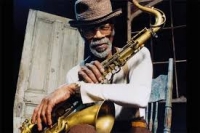
Born in Lima, Ohio, Henderson was one of five sisters and nine brothers. He was encouraged by his parents Dennis and Irene (née Farley) and older brother James T. to study music. He dedicated his first album to them "for being so understanding and tolerant" during his formative years. Early musical interests included drums, piano, saxophone and composition. According to Kenny Dorham, two local piano teachers who went to school with Henderson's brothers and sisters, Richard Patterson and Don Hurless, gave him a knowledge of the piano. He was particularly enamored of his brother's record collection. It seems that a hometown drummer, John Jarette, advised Henderson to listen to musicians like Lester Young, Stan Getz, Dexter Gordon and Charlie Parker. He also liked Flip Phillips, Lee Konitz and the Jazz at the Philharmonic recordings. However, Parker became his greatest inspiration. His first approach to the saxophone was under the tutelage of Herbert Murphy in high school. In this period of time, he wrote several scores for the school band
Lester Young
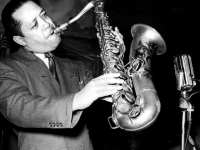
Lester Willis Young, nicknamed "Pres" or "Prez", was an American jazz tenor saxophonist and occasional clarinetist. Coming to prominence while a member of Count Basie's orchestra, Young was one of the most influential players on his instrument.
Jamey Aebersold

Jamey Aebersold (born July 21, 1939 in New Albany, Indiana) is an American jazz saxophonist and music educator. His "Play-A-Long" series of instructional book and CD collections, using the chord-scale system, the first of which was released in 1967, are an internationally renowned resource for jazz education. As of 2009, 126 of these collections have been published by Aebersold, who currently teaches musical improvisation at the University of Louisville. He is also an adept pianist, bassist, and banjoist.
Miles Davis

Miles Dewey Davis III (May 26, 1926 – September 28, 1991) was an American trumpeter, bandleader, and composer.
Widely considered one of the most influential musicians of the 20th century, Miles Davis was, with his musical groups, at the forefront of several major developments in jazz music, including bebop, cool jazz, hard bop, modal jazz, and jazz fusion. Many well-known musicians rose to prominence as members of Davis' ensembles, including saxophonists Gerry Mulligan, John Coltrane, Cannonball Adderley, George Coleman, Wayne Shorter, Dave Liebman, Branford Marsalis and Kenny Garrett; trombonist J. J. Johnson; pianists Horace Silver, Red Garland, Wynton Kelly, Bill Evans, Herbie Hancock, Joe Zawinul, Chick Corea, and Keith Jarrett; guitarists John McLaughlin, Pete Cosey, John Scofield and Mike Stern; bassists Paul Chambers, Ron Carter, Dave Holland, Marcus Miller and Darryl Jones ; and drummers Philly Joe Jones, Jimmy Cobb, Tony Williams, Billy Cobham, Jack DeJohnette, and Al Foster.
On October 7, 2008, his album Kind of Blue, released in 1959, received its fourth platinum certification from the RIAA, signifying sales of 4 million copies. Miles Davis was inducted into the Rock and Roll Hall of Fame in 2006. Davis was noted as "one of the key figures in the history of jazz".
On November 5, 2009, Rep. John Conyers of Michigan sponsored a measure in the US House of Representatives to recognize and commemorate the album Kind of Blue on its 50th anniversary. The measure also affirms jazz as a national treasure and "encourages the United States government to preserve and advance the art form of jazz music." It passed, unanimously, with a vote of 409–0 on December 15, 2009.
Widely considered one of the most influential musicians of the 20th century, Miles Davis was, with his musical groups, at the forefront of several major developments in jazz music, including bebop, cool jazz, hard bop, modal jazz, and jazz fusion. Many well-known musicians rose to prominence as members of Davis' ensembles, including saxophonists Gerry Mulligan, John Coltrane, Cannonball Adderley, George Coleman, Wayne Shorter, Dave Liebman, Branford Marsalis and Kenny Garrett; trombonist J. J. Johnson; pianists Horace Silver, Red Garland, Wynton Kelly, Bill Evans, Herbie Hancock, Joe Zawinul, Chick Corea, and Keith Jarrett; guitarists John McLaughlin, Pete Cosey, John Scofield and Mike Stern; bassists Paul Chambers, Ron Carter, Dave Holland, Marcus Miller and Darryl Jones ; and drummers Philly Joe Jones, Jimmy Cobb, Tony Williams, Billy Cobham, Jack DeJohnette, and Al Foster.
On October 7, 2008, his album Kind of Blue, released in 1959, received its fourth platinum certification from the RIAA, signifying sales of 4 million copies. Miles Davis was inducted into the Rock and Roll Hall of Fame in 2006. Davis was noted as "one of the key figures in the history of jazz".
On November 5, 2009, Rep. John Conyers of Michigan sponsored a measure in the US House of Representatives to recognize and commemorate the album Kind of Blue on its 50th anniversary. The measure also affirms jazz as a national treasure and "encourages the United States government to preserve and advance the art form of jazz music." It passed, unanimously, with a vote of 409–0 on December 15, 2009.
Lennie Niehaus
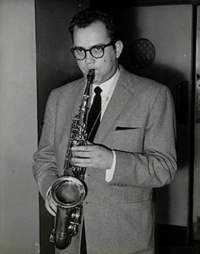
Leonard Niehaus (June 11, 1929 – May 28, 2020) was an American alto saxophonist, composer and arranger on the West Coast jazz scene. He played with the Stan Kenton Orchestra and served as one of Kenton's primary staff arrangers. He also played with Ray Vasquez and trombonist and Vocalist, Phil Carreon and other jazz bands on the U.S. West Coast. Niehaus had a close association as composer and arranging to motion pictures produced by Clint Eastwood.
Ed Huckeby
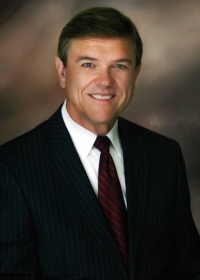
Dr. Ed Huckeby, (b. 1948) is an American composer, musician, conductor, and educator.Huckeby's career in music began in 1968, which marked the start of his eight years teaching music to students in public schools throughout Oklahoma. In 1976, Huckeby was appointed a professor at Northwestern Oklahoma State University, where he would later become music department chair, director of educational outreach, and, in 1990, dean of the graduate school. In 1998–99, Huckeby served as the executive director of Tulsa Ballet (Tulsa, Oklahoma) prior to becoming the associate vice president for academic affairs at Northeastern State University (Broken Arrow, Oklahoma) on July 1, 1999. In January 2010, he became the president of Southwestern Christian University, located in Bethany, Oklahoma.
Sammy Nestico
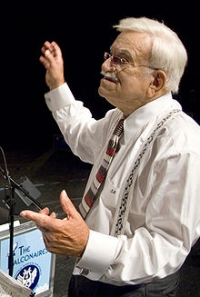
Samuel "Sammy" Louis Nestico (born February 6, 1924 in Pittsburgh, Pennsylvania) is a prolific and well known composer and arranger of big band music. Nestico is most known for his arrangements for the Count Basie orchestra.
Sonny Rollins
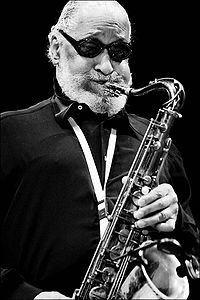
Theodore Walter Sonny" Rollins, American jazz tenor saxophonist. It is considered one of the living jazz legends. Many of his compositions, "St. Thomas", "Oleo", "Doxy", and "Airegin", are among the jazz standards.
Mikis Theodorakis
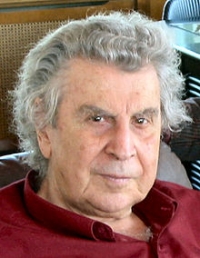
Mikis (Michael) Theodorakis (Greek: Μίκης Θεοδωράκης) (born July 29, 1925, Greek island of Chios) is one of the most popular Greek songwriters and composers. Internationally, he is probably best known for his songs and for his scores for the films Zorba the Greek (1964), Z (1969), and Serpico (1973).
Politically, he identified with the left until the late 1980s; in 1989, he ran as an independent candidate within the centre-right New Democracy party in order for the country to come out of the political crisis that had been created due to the numerous scandals of the government of Andreas Papandreou and helped to establish a large coalition between conservatives, socialists and leftists. In 1990 he was elected to the parliament (as in 1964 and 1981), became a government minister under Constantine Mitsotakis, and fought against drugs and terrorism and for culture, education and better relations between Greece and Turkey. He continues to speak out in favor of left-liberal causes. He has consistently opposed oppressive regimes and was the key voice against the Greek Junta 1967-1974, which imprisoned him. He has expressed his views on Palestine, the War in Iraq, and Greek-Turkish-Cypriot relations. He has been mentioned as a candidate for the election as President of Greece, but he has refused to be considered.
Politically, he identified with the left until the late 1980s; in 1989, he ran as an independent candidate within the centre-right New Democracy party in order for the country to come out of the political crisis that had been created due to the numerous scandals of the government of Andreas Papandreou and helped to establish a large coalition between conservatives, socialists and leftists. In 1990 he was elected to the parliament (as in 1964 and 1981), became a government minister under Constantine Mitsotakis, and fought against drugs and terrorism and for culture, education and better relations between Greece and Turkey. He continues to speak out in favor of left-liberal causes. He has consistently opposed oppressive regimes and was the key voice against the Greek Junta 1967-1974, which imprisoned him. He has expressed his views on Palestine, the War in Iraq, and Greek-Turkish-Cypriot relations. He has been mentioned as a candidate for the election as President of Greece, but he has refused to be considered.
Randy Randolph
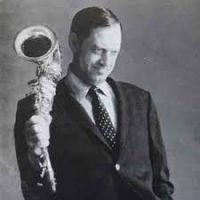
Randy Randolph Musician Songs Percolator Percolator / Yakety Sax · 2008 Yakety Sax Percolator / Yakety Sax · 2018
Greenback Dollar
Greenback Dollar
Katy Perry

Katy Perry (born Katheryn Elizabeth Hudson; October 25, 1984) is an American singer-songwriter. She has risen to prominence with her 2008 single "I Kissed a Girl" which has become a worldwide hit topping the charts in more than 20 countries, including United Kingdom, Canada, Australia, Ireland, and the United States, where it was the 1000th Billboard Hot 100 number 1. Perry has stated in the press that it's thanks to successful British singer-songwriters Amy Winehouse and Lily Allen that more female artists had been appearing on the charts. She went on to say that Winehouse and Allen "have introduced America to great music". She is known for her unconventional style of dress, often humoristic, bright in color and reminiscent of different decades, as well as her frequent use of fruit-shaped accessories, mainly watermelon as part of her outfits. Perry has a contralto vocal range.
Paul Desmond
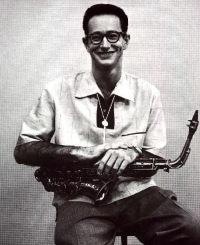
Paul Desmond (November 25, 1924 – May 30, 1977), born Paul Emil Breitenfeld, was a jazz alto saxophonist and composer born in San Francisco, best known for the work he did in the Dave Brubeck Quartet and for penning that group's greatest hit, "Take Five". Known to have possessed an idiosyncratic wit, he was one of the most popular musicians to come out of the West Coast's "cool jazz" scene. He played a Selmer Super Balanced Action alto saxophone with an M. C. Gregory model 4A-18M mouthpiece — both circa 1951 — with Rico 3 ½ reeds.
In addition to his work with Brubeck he led several of his own groups and did significant collaborations with artists such as Gerry Mulligan, Jim Hall and Chet Baker. After years of chain smoking and general poor health, Desmond succumbed to lung cancer in 1977 following one last tour with Brubeck.
In addition to his work with Brubeck he led several of his own groups and did significant collaborations with artists such as Gerry Mulligan, Jim Hall and Chet Baker. After years of chain smoking and general poor health, Desmond succumbed to lung cancer in 1977 following one last tour with Brubeck.
Charlie Brown

Charles "Charlie" Brown is the main character in the comic strip Peanuts by Charles M. Schulz.
Ornette Coleman
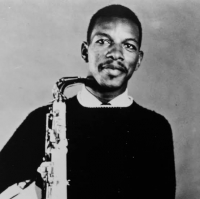
Randolph Denard Ornette Coleman, American jazz musician. The artist, who found free jazz, has tried many forms of music. Having completed his personal revolution in the second half of the 1950s, the artist radicalized the principles of bebop, which was considered the first upset of modern jazz
Charles Papasoff

As life would have it, he threw me a curve And all I could do, was fold to his quest Diving deep into a fantastic oeuvre
And concede that little has really progressed.Human nature defies change and endures as it was during the Bard’s classic time And Man, spinning in space, never matures Yet, at high risk crossroads, he now arrives
And concede that little has really progressed.Human nature defies change and endures as it was during the Bard’s classic time And Man, spinning in space, never matures Yet, at high risk crossroads, he now arrives
Oliver Nelson
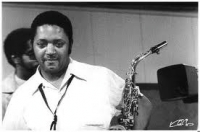
Oliver Edward Nelson (June 4, 1932 in St. Louis, Missouri – October 28, 1975) was an American jazz saxophonist, clarinetist, arranger and composer.
Adam Schlesinger
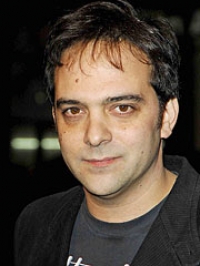
Adam Schlesinger is an American songwriter, composer and record producer. He is the bassist for the bands Fountains of Wayne, Ivy and Tinted Windows. He is an owner of Scratchie Records and Stratosphere Sound, a recording studio in New York City. Schlesinger grew up in Manhattan and Montclair, New Jersey.
Schlesinger was nominated for an Academy Award and a Golden Globe Award for writing the title track of the Tom Hanks-directed film That Thing You Do! as well as two other songs for the film. Fountains of Wayne was nominated for two Grammy Awards in 2003 for Best New Artist and Best Pop Performance by a Duo or Group with Vocal.
Schlesinger and David Javerbaum were nominated for a 2008 Tony Award for Best Original Score for his music for the musical Cry-Baby.
Schlesinger and Javerbaum also received a 2009 Emmy nomination for Outstanding Music And Lyrlcs, for their song "Much Worse Things", performed by Elvis Costello and Stephen Colbert on the television special "A Colbert Christmas: The Greatest Gift Of All!"
Schlesinger was nominated for an Academy Award and a Golden Globe Award for writing the title track of the Tom Hanks-directed film That Thing You Do! as well as two other songs for the film. Fountains of Wayne was nominated for two Grammy Awards in 2003 for Best New Artist and Best Pop Performance by a Duo or Group with Vocal.
Schlesinger and David Javerbaum were nominated for a 2008 Tony Award for Best Original Score for his music for the musical Cry-Baby.
Schlesinger and Javerbaum also received a 2009 Emmy nomination for Outstanding Music And Lyrlcs, for their song "Much Worse Things", performed by Elvis Costello and Stephen Colbert on the television special "A Colbert Christmas: The Greatest Gift Of All!"
Yellowjackets
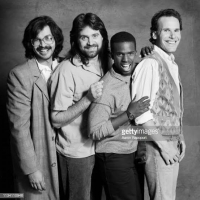
Yellowjackets is an American jazz fusion bandJimmy Haslip, Bob Mintzer, Russell Ferrante,Will Kennedy
Jerry Nowak
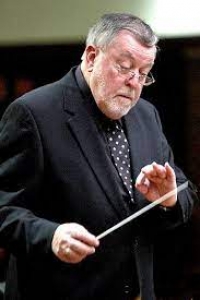
Jerry Nowak is professor of music at Bucks County Community College in Newtown, Pennsylvania. He directs the college's Symphonic Band, Jazz Ensemble and Swing Singers. Jerry has over 800 published arrangements and compositions for instrumental and vocal ensembles.
Traditional

Wayne shorter
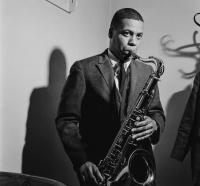
Wayne Shorter is an American jazz saxophonist and composer. More recently, in the late 1950s, he emerged as the primary composer and member of Art Blakey's Jazz Reporters. He joined Miles Davis' Second Big Five in the 1960s, where he founded the jazz fusion group Weather Report. More than 20 albums
Stanely Turrentine
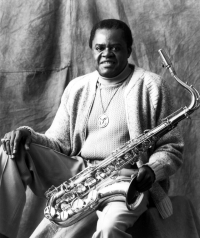
Stanley William Turrentine was an American jazz tenor saxophonist. He began his career playing R&B for Earl Bostic and later soul jazz recording for the Blue Note label from 1960, touched on jazz fusion during a stint on CTI in the 1970s.
John Denver
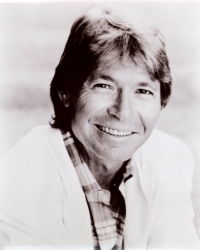
John Denver (December 31, 1943 – October 12, 1997), born Henry John Deutschendorf, Jr., was an American Country Music/folk singer-songwriter and folk rock musician. One of the most popular artists of the 1970s, he recorded and released some 300 songs, about half composed by himself. He was named Poet Laureate of Colorado in 1977. Songs such as "Leaving on a Jet Plane" (1967), "Take Me Home, Country Roads" (1971), "Rocky Mountain High" (1973), "Thank God I'm a Country Boy" (1974), "Annie's Song" (1974), "Sunshine on My Shoulders" (1974), and "Calypso" (1975) are popular worldwide. Denver has been referred to as "The Poet for the Planet", "Mother Nature's Son" (based on The Beatles song he covered) and "A Song's Best Friend".
Joe Farrell
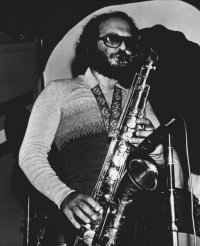
Joseph Carl Firrantello, known as Joe Farrell, was an American jazz multi-instrumentalist who primarily performed as a saxophonist and flutist. He is best known for a series of albums under his own name on the CTI record label and for playing in the initial incarnation of Chick Corea's Return to Forever.
Steve Perry
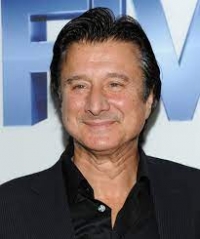
Stephen Ray Perry (born January 22, 1949) is an American singer and songwriter. He is best known as the lead singer of the rock band Journey during their most commercially successful periods from 1977 to 1987, and again from 1995 to 1998. Perry also had a successful solo career between the mid-1980s and mid-1990s, made sporadic appearances in the 2000s, and returned to music full-time in 2018.
Michael Brecker
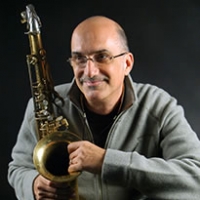
Michael Leonard Brecker (March 29, 1949 – January 13, 2007) was an American jazz saxophonist and composer. Acknowledged as "a quiet, gentle musician widely regarded as the most influential tenor saxophonist since John Coltrane," he has been awarded 15 Grammy Awards as both performer and composer and was inducted into Down Beat's Jazz Hall of Fame in 2007.
jerry bergonzi

Jerry Bergonzi is a jazz tenor saxophonist, composer, and educator. Date of birth: October 21, 1947 (72 years old), Boston, Massachusetts, United States Songs Red's Blues Conjunction · 1992 Creature Feature Peek a Boo · 1993 On Again Off Again Tenorist · 2007
Charlie Parker
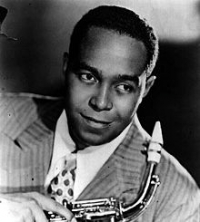
Charles Parker, Jr. (August 29, 1920 – March 12, 1955), famously called Bird or Yardbird, was an American jazz saxophonist and composer.
Parker, with Louis Armstrong and Duke Ellington, is widely considered to have been one of the most influential jazz musicians. Parker acquired the nickname "Yardbird" early in his career, and the shortened form "Bird" remained Parker's sobriquet for the rest of his life, inspiring the titles of a number of Parker compositions, such as "Yardbird Suite", "Ornithology" and "Bird of Paradise."
Parker played a leading role in the development of bebop, a form of jazz characterized by fast tempos, virtuoso technique, and improvisation based on harmonic structure. Parker's innovative approaches to melody, rhythm, and harmony exercised enormous influence on his contemporaries. Several of Parker's songs have become standards, including "Billie's Bounce", "Anthropology", "Ornithology", and "Confirmation". He introduced revolutionary harmonic ideas including a tonal vocabulary employing 9ths, 11ths and 13ths of chords, rapidly implied passing chords, and new variants of altered chords and chord substitutions. His tone was clean and penetrating, but sweet and plaintive on ballads. Although many Parker recordings demonstrate dazzling virtuosic technique and complex melodic lines – such as "Ko-Ko", "Kim", and "Leap Frog" – he was also one of the great blues players. His themeless blues improvisation "Parker's Mood" represents one of the most deeply affecting recordings in jazz. At various times, Parker fused jazz with other musical styles, from classical to Latin music, blazing paths followed later by others.
Parker, with Louis Armstrong and Duke Ellington, is widely considered to have been one of the most influential jazz musicians. Parker acquired the nickname "Yardbird" early in his career, and the shortened form "Bird" remained Parker's sobriquet for the rest of his life, inspiring the titles of a number of Parker compositions, such as "Yardbird Suite", "Ornithology" and "Bird of Paradise."
Parker played a leading role in the development of bebop, a form of jazz characterized by fast tempos, virtuoso technique, and improvisation based on harmonic structure. Parker's innovative approaches to melody, rhythm, and harmony exercised enormous influence on his contemporaries. Several of Parker's songs have become standards, including "Billie's Bounce", "Anthropology", "Ornithology", and "Confirmation". He introduced revolutionary harmonic ideas including a tonal vocabulary employing 9ths, 11ths and 13ths of chords, rapidly implied passing chords, and new variants of altered chords and chord substitutions. His tone was clean and penetrating, but sweet and plaintive on ballads. Although many Parker recordings demonstrate dazzling virtuosic technique and complex melodic lines – such as "Ko-Ko", "Kim", and "Leap Frog" – he was also one of the great blues players. His themeless blues improvisation "Parker's Mood" represents one of the most deeply affecting recordings in jazz. At various times, Parker fused jazz with other musical styles, from classical to Latin music, blazing paths followed later by others.
Quincy Jones
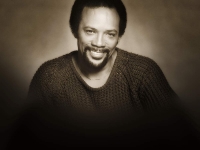
Quincy Delight Jones Jr. (born March 14, 1933) is an American record producer, multi-instrumentalist, singer, composer, arranger, and film and television producer. His career spans over 60 years in the entertainment industry with a record 80 Grammy Award nominations, 28 Grammys, and a Grammy Legend Award in 1992.
Jones came to prominence in the 1950s as a jazz arranger and conductor, before moving on to work in pop music and film scores. In 1969 Jones and his songwriting partner Bob Russell became the first African-Americans to be nominated for an Academy Award for Best Original Song, for "The Eyes of Love" from the film Banning. Jones was also nominated for an Academy Award for Best Original Score for his work on the 1967 film In Cold Blood, making him the first African-American to be nominated twice in the same year. In 1971 he became the first African-American to be the musical director and conductor of the Academy Awards ceremony. In 1995 he was the first African-American to receive the Academy's Jean Hersholt Humanitarian Award. He has tied with sound designer Willie D. Burton as the second most Oscar-nominated African-American, with seven nominations each.
Jones came to prominence in the 1950s as a jazz arranger and conductor, before moving on to work in pop music and film scores. In 1969 Jones and his songwriting partner Bob Russell became the first African-Americans to be nominated for an Academy Award for Best Original Song, for "The Eyes of Love" from the film Banning. Jones was also nominated for an Academy Award for Best Original Score for his work on the 1967 film In Cold Blood, making him the first African-American to be nominated twice in the same year. In 1971 he became the first African-American to be the musical director and conductor of the Academy Awards ceremony. In 1995 he was the first African-American to receive the Academy's Jean Hersholt Humanitarian Award. He has tied with sound designer Willie D. Burton as the second most Oscar-nominated African-American, with seven nominations each.
Bernard Dewagtere
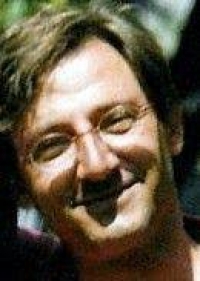
Doctor of musicology, conductor and composer, I manage ACCELERANDO, vocational musical school
Johann Sebastian Bach

Johann Sebastian Bach (31 March 1685 – 28 July 1750) was a German composer and musician of the Baroque period. He is known for instrumental compositions such as the Art of Fugue, the Brandenburg Concertos, and the Goldberg Variations, and for vocal music such as the St Matthew Passion and the Mass in B minor. Since the 19th-century Bach Revival he has been generally regarded as one of the greatest composers of the Western art musical canon.
Cole Porter

Cole Albert Porter (June 9, 1891 – October 15, 1964) was an American composer and songwriter. His works include the musical comedies Kiss Me, Kate, Fifty Million Frenchmen, DuBarry Was a Lady and Anything Goes, as well as songs like "Night and Day", "I Get a Kick out of You", "Well, Did You Evah!" and "I've Got You Under My Skin". He was noted for his sophisticated, bawdy lyrics, clever rhymes and complex forms. Porter was one of the greatest contributors to the Great American Songbook. Cole Porter is one of the few Tin Pan Alley composers to have written both the lyrics and the music for his songs.
Billy Preston
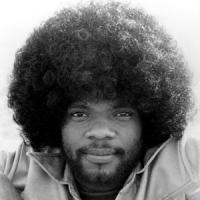
William Everett Preston (September 2, 1946 – June 6, 2006) was an American musician whose work included R&B, rock, soul, funk, and gospel. Preston was a top session keyboardist in the 1960s, during which he backed artists such as Little Richard, Sam Cooke, Ray Charles, and the Beatles. He then went on to achieve fame as a solo artist, with hit pop singles including "That's the Way God Planned It", "Outa-Space", "Will It Go Round in Circles", "Space Race", and "Nothing from Nothing". Additionally, Preston co-wrote "You Are So Beautiful", which became a number 5 hit for Joe Cocker; Stephen Stills asked Preston if he could use his phrase "if you can't be with the one you love, love the one you're with" and created the hit song.
Preston was the only musician to be credited on a Beatles recording other than the group's four members: the group's number-one hit "Get Back" is credited to "The Beatles with Billy Preston". Preston continued to record and perform with other artists, notably George Harrison after the Beatles' break-up, and Eric Clapton, and he played keyboards for the Rolling Stones on many of the group's albums and tours during the 1970s.
Preston was the only musician to be credited on a Beatles recording other than the group's four members: the group's number-one hit "Get Back" is credited to "The Beatles with Billy Preston". Preston continued to record and perform with other artists, notably George Harrison after the Beatles' break-up, and Eric Clapton, and he played keyboards for the Rolling Stones on many of the group's albums and tours during the 1970s.
John Coltrane

John William "Trane" Coltrane (September 23, 1926 – July 17, 1967) was an American jazz saxophonist and composer.
Working in the bebop and hard bop idioms early in his career, Coltrane helped pioneer the use of modes in jazz and later was at the forefront of free jazz. He was prolific, making about fifty recordings as a leader during his recording career, and appeared as a sideman on many other albums, notably with trumpeter Miles Davis and pianist Thelonious Monk. As his career progressed, Coltrane's music took on an increasingly spiritual dimension. His second wife was pianist Alice Coltrane, and their son Ravi Coltrane is also a saxophonist.
He influenced innumerable musicians, and remains one of the most significant tenor saxophonists in jazz history. He received many awards, among them a posthumous Special Citation from the Pulitzer Prize Board in 2007 for his "masterful improvisation, supreme musicianship and iconic centrality to the history of jazz."
Working in the bebop and hard bop idioms early in his career, Coltrane helped pioneer the use of modes in jazz and later was at the forefront of free jazz. He was prolific, making about fifty recordings as a leader during his recording career, and appeared as a sideman on many other albums, notably with trumpeter Miles Davis and pianist Thelonious Monk. As his career progressed, Coltrane's music took on an increasingly spiritual dimension. His second wife was pianist Alice Coltrane, and their son Ravi Coltrane is also a saxophonist.
He influenced innumerable musicians, and remains one of the most significant tenor saxophonists in jazz history. He received many awards, among them a posthumous Special Citation from the Pulitzer Prize Board in 2007 for his "masterful improvisation, supreme musicianship and iconic centrality to the history of jazz."
Dave Liebman
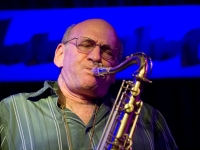
David Liebman is an American saxophonist, flautist and jazz educator. He is known for his innovative lines and use of atonality. He was a frequent collaborator with pianist Richie Beirach. In June 2010, he received a NEA Jazz Masters lifetime achievement award from the National Endowment for the Arts.
Phil Woods
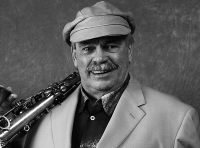
Philip Wells Woods (November 2, 1931 – September 29, 2015) was an American jazz alto saxophonist, clarinetist, bandleader, and composer.Woods was born in Springfield, Massachusetts. He studied music with Lennie Tristano, who influenced him greatly, at the Manhattan School of Music and at the Juilliard School. His friend, Joe Lopes, coached him on clarinet as there was no saxophone major at Juilliard at the time. Although he did not copy Charlie "Bird" Parker, he was known as the New Bird, a nickname also given to other alto saxophone players such as Sonny Stitt and Cannonball Adderley.
Hiromi Uehara

Hiromi Uehara (上原ひろみ, born 26 March 1979), known as Hiromi, is a jazz composer and pianist born in Hamamatsu, Japan. She is known for her virtuosic technique, energetic live performances and blend of musical genres such as post-bop, progressive rock, classical and fusion in her compositions.
Fernanda Brum

Fernanda Brum Costa da Cruz Pinheiro (born 19 December 1976) is a Brazilian Christian singer, songwriter, worship pastor and writer. Fernanda has done theater course, sang jingles among other things. On 18 May 1996, Fernanda Brum married the singer and pastor Emerson Pinheiro music producer, 26 both pastors of Central Baptist Church in Barra da Tijuca. She participated in the group "Voices" for several years.
Louis Armstrong
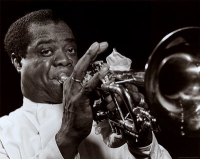
Louis Armstrong (4 August 1901 – July 6, 1971), nicknamed Satchmo or Sachimo and Pops, was an American jazz trumpeter and singer.
Coming to prominence in the 20s as an innovative cornet and trumpet virtuoso, Armstrong was a foundational influence on jazz, shifting the music's focus from collective improvisation to solo performers. With his distinctive gravelly voice, Armstrong was an influential singer, demonstrating great dexterity as an improviser, bending the lyrics and melody of a song for expressive purposes. He was also greatly skilled at scat singing, or wordless vocalizing.
Renowned for his charismatic stage presence, Armstrong's influence extended well beyond jazz, and by the end of his career in the '60s, he was widely regarded as a profound influence on popular music in general: critic Steve Leggett describes Armstrong as "perhaps the most important American musician of the 20th century."
Coming to prominence in the 20s as an innovative cornet and trumpet virtuoso, Armstrong was a foundational influence on jazz, shifting the music's focus from collective improvisation to solo performers. With his distinctive gravelly voice, Armstrong was an influential singer, demonstrating great dexterity as an improviser, bending the lyrics and melody of a song for expressive purposes. He was also greatly skilled at scat singing, or wordless vocalizing.
Renowned for his charismatic stage presence, Armstrong's influence extended well beyond jazz, and by the end of his career in the '60s, he was widely regarded as a profound influence on popular music in general: critic Steve Leggett describes Armstrong as "perhaps the most important American musician of the 20th century."
Santana
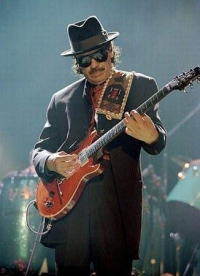
Santana is a flexible number of musicians accompanying Carlos Santana since the late 1960s. Just like Santana himself, the band is known for helping make Latin rock famous in the rest of the world.
The band was formed in 1966 in San Francisco. The first members were Carlos Santana (lead guitar), Tom Frazier (guitar), Mike Carabello (percussion), Rod Harper (drums), Gus Rodriguez (bass) and Gregg Rolie (keyboard, vocal). In the following years the members of the group changed frequently for a number of reasons, and from 1971 to 1972 there was a brief separation between the group and Santana.
Santana himself rarely sings in his songs despite being the leader of the band and recent hits have been frequently accompanied by a guest singer, rather than the members of the band.
In 1998, the group was inducted into the Rock & Roll Hall of Fame, with Carlos Santana, Jose Chepito Areas, David Brown, Mike Carabello, Gregg Rolie and Michael Shrieve being honored.
The band was formed in 1966 in San Francisco. The first members were Carlos Santana (lead guitar), Tom Frazier (guitar), Mike Carabello (percussion), Rod Harper (drums), Gus Rodriguez (bass) and Gregg Rolie (keyboard, vocal). In the following years the members of the group changed frequently for a number of reasons, and from 1971 to 1972 there was a brief separation between the group and Santana.
Santana himself rarely sings in his songs despite being the leader of the band and recent hits have been frequently accompanied by a guest singer, rather than the members of the band.
In 1998, the group was inducted into the Rock & Roll Hall of Fame, with Carlos Santana, Jose Chepito Areas, David Brown, Mike Carabello, Gregg Rolie and Michael Shrieve being honored.
Paul Simon
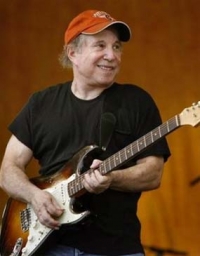
Paul Frederic Simon (born October 13, 1941) is an American songwriter, musician, and member of the Rock and Roll Hall of Fame. In 2006, Time magazine called him one of the 100 "people who shape our world." As of 2007, he resides in New Canaan, Connecticut.
He released Paul Simon in 1972, which contained one of his first experiments with world music, the Jamaican-inspired Mother and Child Reunion, and There Goes Rhymin' Simon in 1973. His 1975 album Still Crazy After All These Years is considered to be among his finest work, particularly the title track and the hit single "50 Ways to Leave Your Lover." The One Trick Pony album, Simon's first album with Warner Bros. Records was also paired with a major motion picture of the same name, with Simon in the starring role. Simon's next album Hearts and Bones, while critically acclaimed, did not yield any hit singles and marked a lull in his commercial popularity in the early 1980s.
In 1985, Simon lent his talents to USA for Africa and performed on the famine relief fundraising single "We Are the World". In 1986 he released the immensely popular Graceland, for which he won a Grammy. The album featured the groundbreaking use of African rhythms and performers such as Ladysmith Black Mambazo. In 1990, he followed up Graceland with the commercially successful and consistent successor album The Rhythm of the Saints, which featured Brazilian musical themes.
His 2000 studio album You're the One, did not reach the commercial heights of previous albums but was considered by many fans and critics to be an artistic success and received a Grammy nomination for Album of the Year. Simon's latest album, Surprise, produced by himself and Brian Eno, was released on May 9, 2006. In commenting on US TV show Ellen what drove him to write material for this latest album, Simon noted the events of September 11, 2001 and also turning 60 since his previous album You're the One.
He released Paul Simon in 1972, which contained one of his first experiments with world music, the Jamaican-inspired Mother and Child Reunion, and There Goes Rhymin' Simon in 1973. His 1975 album Still Crazy After All These Years is considered to be among his finest work, particularly the title track and the hit single "50 Ways to Leave Your Lover." The One Trick Pony album, Simon's first album with Warner Bros. Records was also paired with a major motion picture of the same name, with Simon in the starring role. Simon's next album Hearts and Bones, while critically acclaimed, did not yield any hit singles and marked a lull in his commercial popularity in the early 1980s.
In 1985, Simon lent his talents to USA for Africa and performed on the famine relief fundraising single "We Are the World". In 1986 he released the immensely popular Graceland, for which he won a Grammy. The album featured the groundbreaking use of African rhythms and performers such as Ladysmith Black Mambazo. In 1990, he followed up Graceland with the commercially successful and consistent successor album The Rhythm of the Saints, which featured Brazilian musical themes.
His 2000 studio album You're the One, did not reach the commercial heights of previous albums but was considered by many fans and critics to be an artistic success and received a Grammy nomination for Album of the Year. Simon's latest album, Surprise, produced by himself and Brian Eno, was released on May 9, 2006. In commenting on US TV show Ellen what drove him to write material for this latest album, Simon noted the events of September 11, 2001 and also turning 60 since his previous album You're the One.
Antonin Dvorak

Antonín Leopold Dvořák (English pronunciation: /ˈdvɒrʒɑːk/ DVOR-zhahk or /ˈdvɒrʒæk/ DVOR-zhak; Czech: ( listen); September 8, 1841 – May 1, 1904) was a Czech composer of Romantic music, who employed the idioms of the folk music of Moravia and his native Bohemia. His works include operas, symphonic, choral and chamber music. His best-known works include his New World Symphony, the Slavonic Dances, "American" String Quartet, and Cello Concerto in B minor.
Dvořák wrote in a variety of forms: his nine symphonies generally stick to classical models that Beethoven would have recognised, but he also worked in the newly developed symphonic poem form and the influence of Richard Wagner is apparent in some works. Many of his works also show the influence of Czech folk music, both in terms of rhythms and melodic shapes; perhaps the best known examples are the two sets of Slavonic Dances. Dvořák also wrote operas (of which the best known is Rusalka); serenades for string orchestra and wind ensemble; chamber music (including a number of string quartets, and quintets); songs; choral music; and piano music.
Dvořák wrote in a variety of forms: his nine symphonies generally stick to classical models that Beethoven would have recognised, but he also worked in the newly developed symphonic poem form and the influence of Richard Wagner is apparent in some works. Many of his works also show the influence of Czech folk music, both in terms of rhythms and melodic shapes; perhaps the best known examples are the two sets of Slavonic Dances. Dvořák also wrote operas (of which the best known is Rusalka); serenades for string orchestra and wind ensemble; chamber music (including a number of string quartets, and quintets); songs; choral music; and piano music.
Chico Buarque
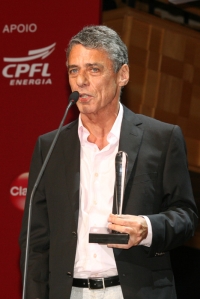
Francisco Buarque de Hollanda, popularly known simply as Chico Buarque, is a Brazilian singer-songwriter, guitarist, composer, playwright, writer, and poet. He is best known for his music, which often includes social, economic, and cultural reflections on Brazil.
Clifford Brown
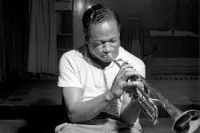
Clifford Brown, American jazz trumpeter. In 1953 he entered the Lionel Hampton orchestra. In 1954, together with drummer Max Roach, he formed a quintet that quickly became famous. It has established itself with its powerful work, richness of inventions and beautiful timbre. His style is a transition between "bop" and "cool".
Maria Muldaur

Maria Muldaur is an American folk and blues singer who was part of the American folk music revival in the early 1960s. She recorded the 1973 hit song "Midnight at the Oasis" and continues to record albums in the folk, blues, early jazz, gospel, country, and R&B traditions.
Steely Dan
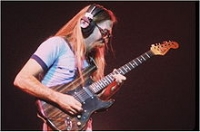
Steely Dan is an American rock band founded in 1972 by core members Walter Becker (guitars, bass, backing vocals) and Donald Fagen (keyboards, lead vocals). Blending rock, jazz, latin music, reggae, traditional pop, R&B, blues, and sophisticated studio production with cryptic and ironic lyrics, the band enjoyed critical and commercial success starting from the early 1970s until breaking up in 1981. Throughout their career, the duo recorded with a revolving cast of session musicians, and in 1974 retired from live performances to become a studio-only band. Rolling Stone has called them "the perfect musical antiheroes for the Seventies".
Gustav Holst

Gustav Theodore Holst (21 September 1874 – 25 May 1934) was an English composer and was a music teacher for nearly 20 years. He is most famous for his orchestral suite The Planets. Having studied at the Royal College of Music in London, his early work was influenced by Ravel, Grieg, Richard Strauss, and fellow student Ralph Vaughan Williams, but most of his music is highly original, with influences from Hindu spiritualism and English folk tunes. Holst's music is well known for unconventional use of metre and haunting melodies.
Holst wrote almost 200 catalogued compositions, including orchestral suites, operas, ballets, concertos, choral hymns, and songs (see Selected works below).
Holst became music master at St Paul's Girls' School in 1905 and director of music at Morley College in 1907, continuing in both posts until retirement.
He was the brother of Hollywood actor Ernest Cossart and father of the composer and conductor Imogen Holst, who wrote a biography of him in 1938.
Holst wrote almost 200 catalogued compositions, including orchestral suites, operas, ballets, concertos, choral hymns, and songs (see Selected works below).
Holst became music master at St Paul's Girls' School in 1905 and director of music at Morley College in 1907, continuing in both posts until retirement.
He was the brother of Hollywood actor Ernest Cossart and father of the composer and conductor Imogen Holst, who wrote a biography of him in 1938.
Ella Fitzgerald
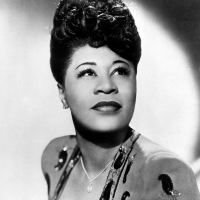
Ella Jane Fitzgerald (April 25, 1917 – June 15, 1996) was an American jazz singer sometimes referred to as the First Lady of Song, Queen of Jazz, and Lady Ella. She was noted for her purity of tone, impeccable diction, phrasing, intonation, and a "horn-like" improvisational ability, particularly in her scat singing. After a tumultuous adolescence, Fitzgerald found stability in musical success with the Chick Webb Orchestra, performing across the country but most often associated with the Savoy Ballroom in Harlem. Her rendition of the nursery rhyme "A-Tisket, A-Tasket" helped boost both her and Webb to national fame. After taking over the band when Webb died, Fitzgerald left it behind in 1942 to start her solo career.
 Sheet Music Exchange is a web site for those who wants to access popular sheet music easily,
letting them download the sheet music for free for trial purposes.
It's completely free to download and try the listed sheet music, but you have to delete the files after 24 hours of trial period.
Don't forget, if you like the piece of music you have just learned playing,
treat the artist with respect, and go buy the original sheet music.
Sheet Music Exchange is a web site for those who wants to access popular sheet music easily,
letting them download the sheet music for free for trial purposes.
It's completely free to download and try the listed sheet music, but you have to delete the files after 24 hours of trial period.
Don't forget, if you like the piece of music you have just learned playing,
treat the artist with respect, and go buy the original sheet music.